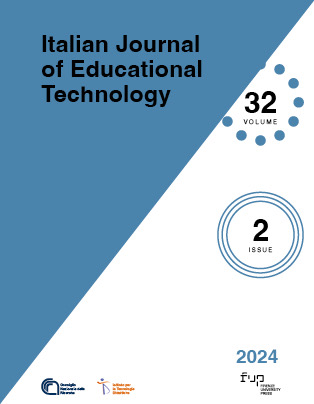Questionario per la valutazione delle competenze digitali dei futuri insegnanti
Contenuto principale dell'articolo
Abstract
Questo studio presenta le fasi preliminari di un processo di validazione di un questionario sviluppato per valutare le competenze digitali dei futuri insegnanti all'Università di Bologna, focalizzato sugli studenti di Pedagogia, Educazione Primaria ed Educazione della Prima Infanzia della Facoltà Giovanni Maria Bertin. Data l'importanza crescente della tecnologia, misurare le competenze digitali è essenziale per i futuri educatori. Il questionario, basato sul “Cuestionario de Competencia Digital para Futuros Maestros” (CCDFM) di Cabero-Almenara et al. (2020), è stato adattato in italiano. Il processo di validazione preliminare descritto nel paper ha compreso l'adattamento culturale, la revisione da parte di esperti e un test pilota. Per garantire l'affidabilità dei dati, sono state utilizzate tecniche come il coefficiente alfa di Cronbach, il KMO e i test di sfericità di Bartlett. L'analisi fattoriale e la rotazione sono state condotte per esaminare la struttura degli item. In un contesto dove l'integrazione tecnologica è essenziale, questo strumento può migliorare la preparazione degli insegnanti e la valutazione delle competenze digitali. I risultati evidenziano la sua rilevanza per l'istruzione e la ricerca, confermando il suo potenziale per migliorare la formazione degli insegnanti e la ricerca sulle competenze digitali.
Dettagli dell'articolo
Fascicolo
Sezione

Questo volume è pubblicato con la licenza Creative Commons Attribuzione 4.0 Internazionale.
Gli autori che pubblicano su questa rivista accettano le seguenti condizioni:
- Gli autori mantengono i diritti sulla loro opera e cedono alla rivista il diritto di prima pubblicazione dell'opera, contemporaneamente licenziata sotto una Licenza Creative Commons CC BY 4.0 Attribution 4.0 International License.
- Gli autori possono aderire ad altri accordi di licenza non esclusiva per la distribuzione della versione dell'opera pubblicata (es. depositarla in un archivio istituzionale o pubblicarla in una monografia), a patto di indicare che la prima pubblicazione è avvenuta su questa rivista.
- Gli autori possono diffondere la loro opera online (es. in repository istituzionali o nel loro sito web) prima e durante il processo di submission, poiché può portare a scambi produttivi e aumentare le citazioni dell'opera pubblicata (Vedi The effect of Open Access).
Riferimenti bibliografici
Cabero-Almenara, J., Barroso-Osuna, J., Gutiérrez-Castillo, J. J., & Palacios-Rodríguez, A. (2020). Validación del cuestionario de competencia digital para futuros maestros mediante ecuaciones estructurales. Bordón. Revista De Pedagogía, 72(2), 45-63. https://doi.org/10.13042/Bordon.2020.73436
Calvani, A. (2013). ICT in schools: Ten recommendations for policy makers. Form@re-Open Journal for Networked Education, 13(4), 30-46.
Carretero, S., Vuorikari, R., & Punie, Y. (2017). DigComp 2.1: The digital competence framework for citizens with eight proficiency levels and examples of use. Publications Office of the European Union. https://doi.org/10.2760/38842
Chaw, L. Y., & Tang, C. M. (2022, October). The relative importance of digital competencies for predicting student learning performance: An importance-performance map analysis. In 21st European Conference on e-Learning ECEL 2022 (p. 61).
Crompton, H. (2017). ISTE standards for educators: A guide for teachers and other professionals. International Society for Technology in Education.
Garzón-Artacho, E., Sola-Martínez, T., Romero-Rodríguez, J. M., & Gómez-García, G. (2021). Teachers' perceptions of digital competence at the lifelong learning stage. Heliyon, 7(7),.https://doi.org/10.1016/j.heliyon.2021.e07513
Hatlevik, O. E., Throndsen, I., Loi, M., & Gudmundsdottir, G. B. (2018). Students' ICT self-efficacy and computer and information literacy: Determinants and relationships. Computers & Education, 118, 107-119. https://doi.org/10.1016/j.compedu.2017.11.011
Hernández González, O. (2021). Aproximación a los distintos tipos de muestreo no probabilístico que existen. Revista Cubana de Medicina General Integral, 37(3). http://scielo.sld.cu/scielo.php?script=sci_arttext&pid=S0864-21252021000300002
Instefjord, E. J., & Munthe, E. (2017). Educating digitally competent teachers: A study of integration of professional digital competence in teacher education. Teaching and Teacher Education, 67, 37-45.
Martínez Ramírez, J. L. (2019). El proceso de elaboración y validación de un instrumento de medición documental. Acción y Reflexión Educativa, 44(2019), 50-63. https://revistas.up.ac.pa/index.php/accion_reflexion_educativa/article/view/673
Méndez, V. G., Suelves, D. M., Méndez, C. G., & Ramon-Llin, J. A. (2023). Future teachers facing the use of technology for inclusion: A view from the digital competence. Education and Information Technologies, 28, 9305-9323. https://doi.org/10.1007/s10639-023-11649-w
Ministerio de Asuntos Económicos y Transformación Digital. (2021). Plan Nacional de Competencias Digitales.
Napal Fraile, M., Peñalva-Vélez, A., & Mendióroz Lacambra, A. M. (2018). Development of digital competence in secondary education teachers' training. Education Sciences, 8(3), 104.
O'Dwyer, L. M., & Bernauer, J. A. (2014). Quantitative research for the qualitative researcher. SAGE Publications. https://doi.org/10.4135/9781452270114
Parra-González, M. E., López-Belmonte, J., Segura-Robles, A., & Moreno-Guerrero, A. J. (2021). Gamification and flipped learning and their influence on aspects related to the teaching-learning process. Heliyon, 7(2), e06254. https://doi.org/10.1016/j.heliyon.2021.e06254
Ranieri, M. (2022). Teachers' digital competencies. In The direct digital integrated apprenticeship (TDDI). The experimental project for the development of teachers' and teachers' skills (pp. 49-60). Florence University Press.
Redecker, C. (2017). European framework for the digital competence of educators: DigCompEdu. Luxembourg: Publications Office of the European Union. https://doi.org/10.2760/159770
Riquelme-Plaza, I., Cabero-Almenara, J., & Marín-Díaz, V. (2022). Validation of the digital teaching competence questionnaire in Chilean university teachers. Revista Electrónica Educare, 26(1), 1-15. https://doi.org/10.15359/ree.26-1.22
Streiner, D. L., & Norman, G. R. (1995). Health measurement scales: A practical guide to their development and use. Oxford Medical Publications.
Tammaro, R., Iannotta, I. S., & Zanazzi, S. (2020). Assessing digital competence: A review of assessment practices in Primary Teacher Education degree programs. Form@re - Open Journal Per La Formazione in Rete, 20(1), 187-202. https://doi.org/10.13128/form-8744
Tsankov, N., & Damyanov, I. (2019). The digital competence of future teachers: Self-assessment in the context of their development. International Journal of Interactive Mobile Technologies (iJIM), 13(12), 4-18. https://doi.org/10.3991/ijim.v13i12.11004
Vaske, J. J., Beaman, J., & Sponarski, C. C. (2017). Rethinking internal consistency in Cronbach's alpha. Leisure Sciences, 39(2), 163-173. https://doi.org/10.1080/01490400.2015.1127189

